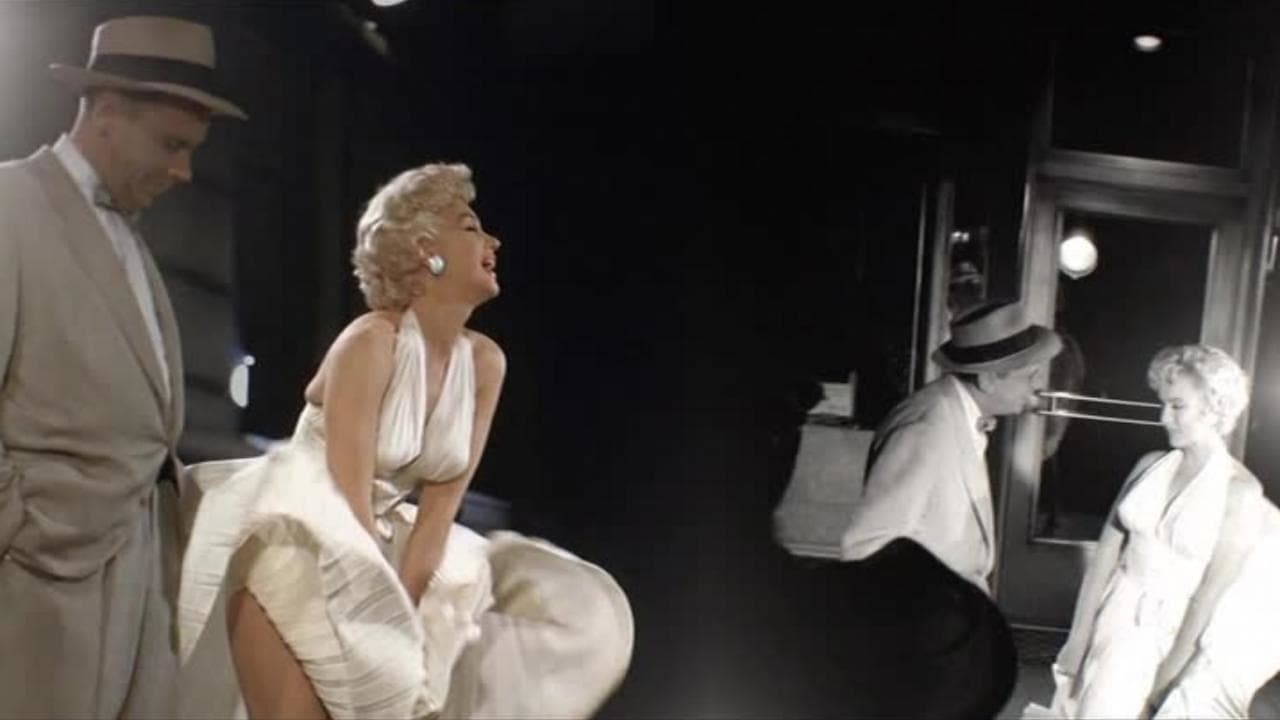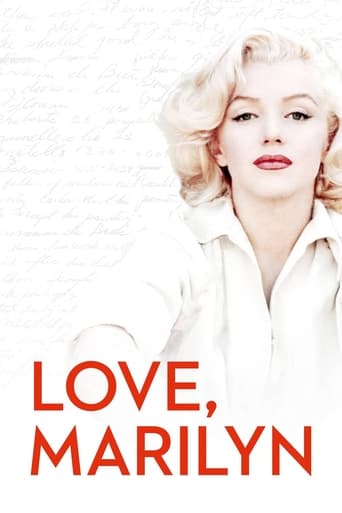

I was quite excited to watch this documentary on Marilyn Monroe and was extremely disappointed, insulted almost. It's like they didn't trust the audience to be interested in Marilyn's story so they threw in some b-list celebrities to dramatically read excerpts from her journals. This results in awkward "readings" and terrible camera work superimposed over photos of Marilyn's writing. It was distracting and annoying and really subtracted from the content. This had the potential to be great but was destroyed by the odd approach of injecting "celebrities" to make the documentary more "interesting". I definitely do not suggest this film.
... View MoreWhile it's interesting after a fashion to hear these actors read her journals and try to make them come alive, sometimes too empathetically, it becomes repetitive after a while. What could have added an extra needed dimension to this since they gathered such an amazing array of talent is to have these respected thespians, well except for Lohan, tell what value they found in Marilyn's work and what she meant to them. It would have added a more personal touch and since the actors involved are a broad spectrum of ages and techniques it would have shown how someone who was often dismissed as a lightweight had an impact on screen that bridged generations.Still this is worth seeing, if for nothing else the clips of Marilyn. Only a few are different from the ones that are usually shown but as always she glows with an interior light.
... View MoreRarely is the public ever allowed to see the private journals written by major movie stars or public figures who die tragically. In this film - Marilyn Monroe is exposed in ways that reveal who she truly was. A woman trying to figure out who she was, using acting as therapy. Having been abandoned as a child, she spent her life trying to receive the love and approval that she never got from her birth parents.One of the most stunning things about Marilyn is that she was poetic and far more articulate than anyone ever gave her credit for. Hearing her own words against the backdrop of the times shows her fragility in ways that have never been seen before. Told through archival and film clips, interviews with people she knew and film historians, actors provide dramatic readings of the materials written by both the actress and observers at that time. Some startling revelations also exonerate and vindicate her to a great degree. For instance, the many stories about her being late to the set and unable to perform can be explained by the fact that her acting process was different. As Actor's Studio coach Lee Strasberg said - she was one of the most sensitive and talented of any actor he ever worked with. That would explain, then, why Billy Wilder had such a time trying to give her explicitly technical direction. Not to mention, Laurence Olivier thoroughly insulted her as she out-performed him on camera.She was also dismayed by the fact that she was presented as so stupid that she wouldn't be able to tell that Jack Lemmon and Tony Curtis were actually men in drag and not women. That whole comic story line was dependent upon her character's stupidity. Only the joke was on her. Her first marriage to Joe DiMaggio was fraught with turmoil due to the demands of her career. They divorced, but when she was lied to and locked away in a sanitarium without her knowledge and consent - it was DiMaggio who came to her rescue. Alarmed at how she had fallen in with people he felt exploited her, he asked her to remarry him on August 1, 1961, but she was found dead August 5. In fact, he loved her so much that he had red roses delivered three times each week to her grave site for two decades. An acquaintance of Marilyn said that it was during her time with Arthur Miller that she began using barbiturates to sleep. It isn't any wonder, given that Miller told the press that they were to marry before he even asked her. It was clear that he used her. First, to get out of his House Un-American Activities Commission debacle, then to get material, writing unflattering and malicious things about her in his journals. Then he rubbed salt in the wound by putting these details in The Misfits, forcing her to make fun of herself in cruel ways. Miller also wound up schtupping a photographer he met on the set - apparently right under Marilyn's nose. No wonder it was her last film. Drugs are a funny thing. If you're fragile, you get hooked - for a lifetime.But once Marilyn was rid of Miller, she was really looking to working with Lee Strasberg in her production company to create the kinds of projects that inspired her. That, and the fact that DiMaggio's son had spoken to her the night she died, saying she seemed just fine makes it apparent that she did not commit suicide. She was on a number of medications at the time so it was probably accidental. Her legendary romps with the Kennedy boys are the stuff of sordid tabloids, but it wasn't talked about until decades later. Marilyn was known to have a journal documenting her affairs and conversations. Before she died, rumors were circulating that she planned a press conference that following Monday. If that is the case, it would seem that the Kennedy boys, who had used and cast her aside would stand a lot to lose. Especially since Bobby Kennedy is said to have been at the scene before the coroner when Marilyn's body was found. Most likely, to destroy her latest journal. Who told him about it? Seems like maybe he already knew.And what better way to debase and invalidate someone than to insinuate that they were so unhappy that they killed themselves? It would certainly feed the male egos of the men who rejected her. But she got the last laugh, because her candle has been lit for half a century. Wherever she is, she must be smiling - especially now that her true voice has finally been heard -- for the first time ever.
... View MoreI went to this movie knowing very little about Marilyn Monroe, and glad to have the opportunity to learn more about her. Unfortunately, the way the film was put together made it highly disappointing to me.We are told at the start that recently unearthed writings of the actress herself are to be incorporated in the film, and this sounded promising to me. However, the rediscovered writings are actually the biggest problem with this movie. While these notes, journal entries, etc. show Marilyn Monroe at her most honest and unguarded, they are included via dramatic readings by a long list of contemporary actors. The actors are shot superimposed on images of the original writings themselves, pages filled with a rather childish scrawl. The photography of the actors as they read is filled with hyperactive panning, zooming and cutting that quickly becomes highly distracting. Also, the actors' dramatic readings are generally stilted and end up being quite grating because as examples of acting they are very subpar. Unaccountably, the actors often do not read Marilyn's exact words, carelessly omitting or adding a word here or there. You know this because the actor is reading the line while the line is shown enlarged in the background at the same time in Marilyn's handwriting. Sometimes the version read by the actor is actually meaningfully different because of the omission or inclusion of a word or two. I couldn't understand why short phrases couldn't just be read accurately by the actors... or was this their "attempt" to add their own interpretation to historical documents that should have simply been left alone?Toward the end of the movie, I took to closing my eyes whenever an actor came on screen to declaim yet another excerpt from Marilyn Monroe's diaries. Not watching the hyperactive camera work made these frequent interludes more bearable but they were still painful enough.It seems obvious that the film maker decided that having a narrator simply read the excerpts from Marilyn's diaries as a voice over would be too boring or passe. The film maker apparently thought that dramatic readings by well-known actors would jazz up the journal writings and make the film more exciting for viewers. In my case this did not happen and I really hated this pointless approach to the written text.Simply put, the film maker's obsession with making historical material more exciting/lively was a complete turnoff for me. The dramatic readings were frequent, intrusive, uninteresting and often ridiculous. This is what happens when someone tries too hard to be liked.As you have no doubt guessed I do not recommend this movie. If there's another way to learn more about Marilyn Monroe through a movie, then do yourself a favor and go that other way.
... View More